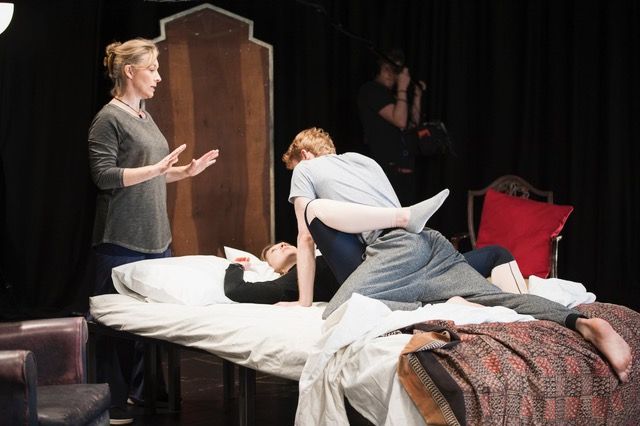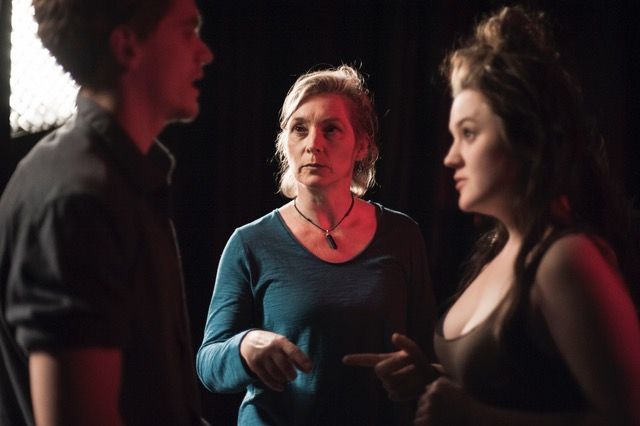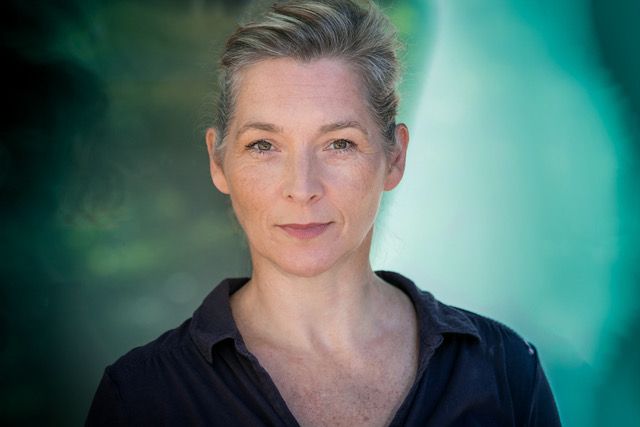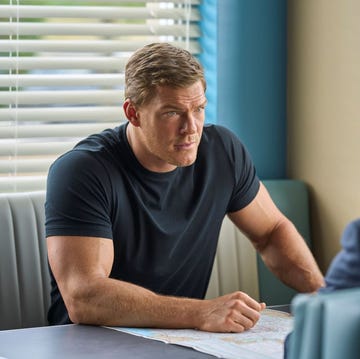You may not know Ita O’Brien’s name, but if you’re at all in the loop about prestige television, you know her work. O’Brien is a pioneer in the emerging field of intimacy coordinators, a new category of Hollywood professionals who work on film and television sets to choreograph simulated sex between actors. Yet this challenging and necessary work is so much more than choreography—it’s also a constant negotiation of consent and communication, with intimacy coordinators balancing the safety of performers alongside the vision of writers and directors. In the wake of the #MeToo movement and Hollywood’s continuing reckoning with rampant sexual misconduct, intimacy coordinators have become a fixture on film and television sets, yet O’Brien argues that the role has yet to reach a necessary point of saturation in the industry, with a long road still ahead in the way of standardising how we keep actors safe.
O’Brien has lent her talents to projects including Normal People, The Great, Watchmen, Sex Education, and most recently, I May Destroy You, where she faced one of her most provocative and boundary-shattering assignments yet. With Chewing Gum genius Michaela Coel spearheading the project as writer, director, and star, the show centres on Arabella, a gregarious young writer in London who must question her reality and rebuild her life after she is drugged and sexually assaulted. Inspired by Coel’s own experience of suffering a sexual assault after her drink was spiked, I May Destroy You threads a breathtaking needle in depicting the messy, non-binary nature of consent, as well as in showcasing sexual encounters not often seen on television: an assault involving two men, an assault involving the removal of a condom mid-intercourse, and period sex, just to name a few. O’Brien was instrumental in bringing these scenes to life, working closely with Coel and other performers to fully and safely realise what existed on the page.
O'Brien's path to becoming an intimacy coordinator started at the tender age of three, when she began training as a ballerina. She trained all the way to adulthood, working as a musical theatre dancer and actor before she completed a Master of Arts in Movement Studies at the Central School of Speech and Drama. When she put on her own play in 2009, while working as a movement teacher and movement director, she began exploring processes and practices by which she could keep her actors safe as they performed intimate content. Those processes and practices grew into her Intimacy on Set Guidelines, which are increasingly becoming standard throughout the industry.
In an interview with Esquire, Paapa Essiedu, who plays Kwame, a friend to Arabella who suffers a sexual assault of his own at the hands of another man in Episode Four, likened intimacy coordinators to stunt choreographers, saying, “I honestly cannot imagine a world where you do scenes that demand this level of intimacy without an intimacy coordinator. To me, it’s insane. You would never film Crouching Tiger, Hidden Dragon without someone on set whose job it is to make sure you don't cut someone's head off. I think intimacy coordinators are crucial in that same way.”
Like Essiedu, O’Brien feels that intimacy coordinators should be as ubiquitous and normalised as stunt choreographers. As such, in addition to her work on film and television sets, she founded Intimacy on Set, an organisation that works to train a fleet of intimacy coordinators under the “Intimacy on Set” guidelines. O’Brien spoke with Esquire from her home office in London, where she brought us up to speed on the process of choreographing a scene, the importance of the groundbreaking encounters depicted in I May Destroy You, and the methods by which she cares for actors grappling with their own sexual trauma.
Esquire: Tell me about your path to becoming an intimacy coordinator and developing your Intimacy on Set Guidelines.
Ita O'Brien: I taught from 2008 to 2015. I gradually honed what I taught and how I taught it, then developed guidelines, which I was asked to share with Equity in the UK in the summer of 2017. Then Weinstein happened, and the industry said, “We have to do better.” But even at that point, intimacy coordinators weren’t standard. Sex Education was the first program that employed me purely as an intimacy coordinator; they said, “We need you because of the content and the young cast.” We worked together to integrate how the process of the intimacy guidelines worked, particularly when it came to rehearsal time. When I say we need to rehearse, people always say, “You're taking up too much time.” In the early days, it was always that feeling of coming in and having to push back to get the time and space we needed.
There’s some irony in people comparing intimacy coordinators to stunt coordinators. I'd say, “I need time to rehearse,” and then I’d see a note in the rehearsal schedule about a stunt rehearsal. I’d say, “That's what I need.” They would never talk about a stunt and say, “We'll give you the swords, we'll put you in front of the camera, and you'll just get on with it.” Everybody knows that's ridiculous, but that's the equivalent of what's happening with intimate content. Since April 2018, there’s been huge learning and huge development. There’s been constant professional interrogation of rewriting intimacy coordinators into the processes and protocols, but we're now consistently having the joy of acting as bystanders on amazing productions, and then producing the work safely.
ESQ: Walk me through the process of choreographing a scene with actors.
IO: This situation is best practiced before the filming event starts. The work is always about honouring the writing and the director's vision. In the case of I May Destroy You, for the scene of sexual assault in episode four, we were there with Paapa and Samson [Ajewole, who plays Malek], as well as with Sam Miller [co-director] and Michaela. Michaela kept saying, “And then this happens,” but I said, “That's not written. You've got every single detail absolutely clear, but why isn't this written?” She said, “I don’t want everybody to be reading that.” I said, “That’s what I need, and then I can give you the scene that you want.” Once we get all that detail, we can create a basic shape. What’s so important with a scene is what the positions will be. Once we know the shape, we agree on touch. Where can we touch? Where's your yes? Most importantly, where’s no? What's not in play? Once you know what body parts are in play, we walk through the scene, getting agreement and consent about positions and where to touch. We also put safety cushions in place—if you've got genital to genital contact, we'll put cushions in place so that during the rehearsal process, you’ll feel more comfortable.
It’s also about making sure that the details are right. One of the details with anal sex, for example, is the difference of legs parallel to legs in turnout. Samson would say, “It’s got to be legs in parallel.” If those details are wrong, the queer community will know. We have to make sure we’re honouring those details and getting them right. That much is all rehearsed, and then when it comes to the day on set, which is months later, I always reconnect with the director the night before, reconnect with the actors, evaluate any concerns, and reconnect with wardrobe. Back on set on the day of, it’s the same thing—touch base with the script, reread it, redefine it physically, and re-agree on consent. It’s about choreographing the beats and making sure that every single beat in the scene is honoured and clocked, so that there's an absolutely clear and known physical structure. Once the performers know that and it comes time to film it, they can inject it with emotional beats.
ESQ: With I May Destroy You, so much of what you're filming are scenes of nonconsensual sex. Is the process of choreographing a scene of violation different from choreographing a loving encounter?
IO: The steps are the same, but there’s an added awareness and care—physical, emotional, and psychological. Of course you care for the person playing the victim, but you also have to care for the person playing the perpetrator, who has to go to that place in themselves. We have to make sure that they’re separating who they are personally from who they are professionally, and bringing all of their skill and craft to that character. In nonconsensual scenes, I rehearse the physicality more, so that they're absolutely anchored and safe within the physical structure. With that, they can really release themselves into the emotional journey.
It’s also important to prioritise self-care. It's important for me to bookend the day of work by speaking with the actors about what they need to do to let go of where they've gone and come back to themselves. I don’t want them keeping a residue of where they've been. I also check in with them a day or so later, just to make sure that they’re happy with the work and that we can address any concerns they may have.
ESQ: In this show, Michaela Coel is fictionalising her own sexual trauma. How did you provide special care for her as she performed a version of her own trauma with a hundred crew members watching?
IO: In 2014, I was working on a devised piece about consent. My actors explored catcalling on the street from both the victim and the perpetrator perspective. My awareness of how to care for victims really grew from there, because I noticed how everybody was comfortable saying they’d been wolf-whistled or groped, but when I asked everybody to look into themselves as perpetrators of these behaviours, that was a sticky day. As a result of that, I sourced an artist wellbeing practitioner named Lou Platt. On several projects, when there has been challenging subject matter that can be triggering, be it for the writer, director, or the performer, I call Lou. I suggested her to the production in order to support Michaela and anybody else who might feel triggered. If things became overwhelming, we brought Lou in. Sometimes she was available to speak on the phone, and other times she came to set.
Part of this negotiation is time. The industry fears that these steps waste time, but if you take that time to rehearse and check in with performers, then it means that what you put in front of the camera is a known quantity. It's better quality; it's efficient; it's going to serve the beats of the scene; it's repeatable. When someone needs that emotional and psychological support, it’s important to take fifteen minutes. That actor will be able to be reset, reground themselves, and give their best performance possible, whereas if that time isn’t taken, you’ll see it on camera. I'm not an expert in emotional psychological triggering, but part of my job is to recognise the physicality of someone who’s uncomfortable, or someone who is saying yes when I can see in their body that it’s really a no. From there, I can refer that person on.
ESQ: In episode three, Arabella and Biagio have sex while she’s on her period, with Biagio going so far as to remove Arabella’s tampon and play with her blood clot between his fingers. I’ve never seen such a frank depiction of a woman’s period on television. Why was it important to Michaela to depict this, and what was the process of bringing it to life?
IO: We kept saying, “This is so brilliant.” What female character, let alone a black female writer, has included the narrative around periods? When I’m working, one of the first things I say to producers is to consider the gender parity in the crew when filming an intimate scene. If you got a heterosexual sex scene, it very often will mean that you have one woman acting on nothing but the male gaze. You've got a lone woman performing what could be a very vulnerable scene. If you've got a lesbian sex scene, you've got only two women with what could be nothing but the male gaze. If they haven't got a female DP or a female first AD or a female boom operator, even just one makes such a difference. One of the other things I advise production to do is to ask their actresses their menstrual cycles so that intimate scenes will not fall when they're menstruating. That was very much part of Michaela's narrative—she didn't hide when she was menstruating. It’s really important that this becomes normalised.
Obviously I didn't have to talk Michaela through the beats of the scene because she wrote it, but when I talked with Marouane [Zotti], who played Biagio, he couldn’t believe that Arabella would be wearing a pad and a tampon at the same time. Half the population of the world spends roughly forty years of their lives menstruating, and of those years, twelve weeks a year works out to about 480 weeks in a lifetime. Half the population of the world deals with the paraphernalia of menstruation, yet it is not encountered, not discussed, and certainly not shared on our screens. I was so delighted and so honoured to take part in this; it felt so important for this scene to be played. I love how Michaela has written Biagio's response. There's no disgust, but just curiosity, gentleness, and acceptance. I love that feeling, and that beauty of a blood clot. I'm really proud to have supported the creation and the choreography of that scene. The prop department was superb in getting it perfect. I was concerned that it could look gross, but it was just right.
This is all so characteristic of Michaela. Even the abusive scenes just happen. They're not sensationalised; they're not mega. So often, abusive situations occur in the gaps and the cracks of life. They just happen. Kwame’s assault fundamentally affects his whole life, but the moment itself is so slight. Likewise with the period sex, it's easy and it feels good. It’s not made to be a mega, sensational thing.
ESQ: What advice do you have for a young person thinking they might want to have a career as an intimacy coordinator?
IO: Live life first. Get experience. It's not a job for a young person. When I say young person, I mean someone in their early twenties. In my program, the minimum age to even start training as an intimacy coordinator is 28. You need somebody who understands the actor's process and the director’s process. Counsellors and sex therapists have contacted me saying that they’d make good intimacy coordinators, but that’s not the case. What we're doing is working as part of the crew and the industry. I need people who are movement people, who know the actor's process and have the training to embody it. They also need an understanding of anatomy, so that we can bring dexterity and physicality, then create a language through that physicality. Only then can we give a beautiful, detailed journey through intimate content, while also keeping it professional.
An intimacy coordinator also needs to be able to detect when someone feels uncomfortable, or when the director feels that their vision isn’t being put in place. It’s also about knowing when to step back and hold the space. There's all of that complexity. If you go on my website, we have four stages, the first of which is a rigorous application process. Then it's into stage two, which is six months of ongoing training. Only if you've been successful through all of that do you go on to mentorship, which means shadowing in work for theatre, television, or film. Through apprenticeship and learning on the job, you build up hours, and then gradually, you reach the amount of hours required to merit a full assessment for accreditation. It’s a long process, but it should be, because we’re saying we can keep people safe, and that takes a lot of skills. Only when a practitioner is fully accredited can they be trusted to keep people safe while also creating fantastic, exciting, artistic intimate content.
Adrienne Westenfeld is the Books and Fiction Editor at Esquire, where she oversees books coverage, edits fiction, and curates the Esquire Book Club.
















